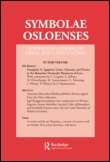
Symbolae Osloenses
Scope & Guideline
Unveiling the Legacy of Ancient Cultures
Introduction
Aims and Scopes
- Classical Literature Analysis:
The journal emphasizes in-depth analysis of classical texts, including works from Greek and Latin literature, exploring their literary techniques, themes, and historical contexts. - Interdisciplinary Approaches:
It encourages interdisciplinary research that combines classical studies with fields such as ethnography, philosophy, and rhetoric, fostering a broader understanding of ancient cultures. - Textual Criticism and Manuscript Studies:
The journal publishes research on textual criticism, manuscript traditions, and the transmission of classical texts, contributing to the preservation and understanding of ancient literature. - Cultural and Historical Contexts:
Studies often investigate the cultural and historical contexts of classical works, examining their relevance to contemporary issues and their influence on later traditions. - Language and Linguistic Studies:
An important focus is also on the linguistic aspects of ancient texts, including syntax, semantics, and the evolution of language from archaic to post-classical Greek.
Trending and Emerging
- Reflexivity and Self-Contextualization:
There is a growing interest in reflexivity within classical texts, examining how authors engage with their own narratives and contexts, which enhances understanding of ancient philosophical thought. - Ethnographic and Ethological Perspectives:
Recent works explore the intersections of ethnography and ethology in classical literature, indicating a trend towards understanding ancient cultures through comparative frameworks. - Manuscript Tradition and Textual Variants:
A renewed focus on manuscript studies and the examination of textual variants suggests an increasing awareness of the complexities involved in the transmission of classical works. - Intertextuality and Literary Influence:
The examination of intertextuality, particularly how classical texts influence each other and later works, is gaining traction, reflecting a broader interest in literary networks. - Gender Studies and Representation:
Emerging research is delving into themes of gender and representation in classical texts, indicating a shift towards more inclusive and critical analyses of ancient literature.
Declining or Waning
- Magic and Supernatural Themes:
Research related to magical texts and supernatural elements in ancient literature appears to be less frequent, indicating a waning interest in this niche area of classical studies. - Historical Linguistics Specifics:
While linguistic studies remain significant, specific historical linguistic analyses, particularly those focusing exclusively on obscure grammatical features, have become less prevalent. - Political and Social Commentary in Classical Texts:
The exploration of political and social commentary within classical texts, which used to be a robust area of inquiry, seems to be diminishing, possibly due to the increasing focus on textual and literary analysis. - Comparative Studies with Non-Classical Traditions:
Comparative analyses that engage with non-classical literary traditions are appearing less frequently, suggesting a narrowing of focus towards classical texts alone.
Similar Journals

MNEMOSYNE
Illuminating the past through rigorous research.MNEMOSYNE is a prestigious academic journal published by BRILL, specializing in the fields of Archeology, Classics, History, Linguistics and Language, and Literature and Literary Theory. With a remarkable history dating back to its inception in 1948, this journal continues to be a crucial resource for scholars and researchers, spanning its publication years that extend to 2024. The journal boasts high rankings in multiple categories according to Scopus, including Q1 status in Classics and History, reflecting its impact and relevance in the academic community. Although it is not an Open Access journal, its selection of peer-reviewed articles ensures rigorous scholarship that contributes to ongoing discussions and discoveries in the humanities. By providing a platform for innovative research and critical discourse, MNEMOSYNE plays an integral role in advancing the understanding of cultural and historical contexts, making it an essential read for both seasoned academics and emerging scholars alike.
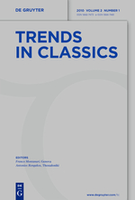
Trends in Classics
Advancing scholarship in the timeless realm of Classics.Trends in Classics is a distinguished academic journal published by WALTER DE GRUYTER GMBH, dedicated to advancing the field of Classics through critical scholarship and innovative research. With an ISSN of 1866-7473 and an E-ISSN of 1866-7481, this journal offers a platform for scholars from around the globe to share insights on classical literature, history, and archaeology. Indexed in Scopus and awarded a respectable Q4 classification in Classics, it ranks 48th out of 170 in the Arts and Humanities category, placing it in the top 72nd percentile—an indicator of its growing influence and contribution to the field. Operating from Germany, specifically from Genthin Strasse 13, D-10785 Berlin, the journal spans converged years from 2009 to 2024, fostering ongoing dialogues and developments within classical studies. Although it does not currently offer open access, its commitment to scholarly excellence makes it a vital resource for researchers, professionals, and students alike, who seek to deepen their understanding of ancient cultures and their lasting impacts on contemporary society.
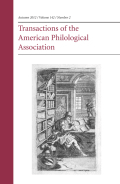
Transactions of the American Philological Association
Elevating Academic Dialogue in Literature and LinguisticsTransactions of the American Philological Association, published by Johns Hopkins University Press, is a leading academic journal dedicated to advancing the study of classics, linguistics, and literary theory. With an impressive impact factor solidified by its 2023 rankings—Q1 in Classics and Literature and Literary Theory, and Q2 in Linguistics and Language—this journal stands as a pivotal resource for scholars and practitioners in the humanities. The journal boasts a rich history of published research dating back to 2002, providing insights that address both contemporary and historical inquiries within its fields of study. Although it does not follow an Open Access model, its rigorous peer-review process ensures high-quality contributions that are essential for those engaged in advanced research. With an extensive reach, reflected in its robust Scopus rankings, Transactions of the American Philological Association plays an indispensable role in shaping the discourse for academics and students alike.

Antichthon
Unveiling Insights from the Ancient WorldAntichthon, published by Cambridge University Press, stands as a vital platform within the field of Classics. Established in 1986, the journal has evolved to encompass scholarly contributions that explore various dimensions of classical studies, including literature, history, and cultural studies. With its rich publication history extending from 2011 to 2023, Antichthon boasts a commendable Q2 ranking in the latest 2023 Category Quartiles for Classics, reflecting its significant impact in the academic community. Although the journal does not offer an Open Access option, it continues to engage researchers and academics with its curated selection of articles, reviews, and critical insights. Located at the Edinburgh Building, Shaftesbury Rd, Cambridge, England, this journal remains an essential resource for both established scholars and students aiming to deepen their understanding of classical antiquity and its enduring relevance.
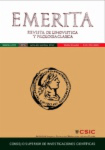
Emerita
Exploring the Depths of Classics and LinguisticsEmerita is a distinguished academic journal published by CONSEJO SUPERIOR INVESTIGACIONES CIENTIFICAS-CSIC in Spain, focusing on the fields of Classics and Linguistics. With its roots dating back to 1971, Emerita has established itself as an open-access publication since 1974, ensuring broad accessibility for researchers, professionals, and students alike. This journal's commitment to scholarly excellence is reflected in its 2023 Q2 classification in Classics and Q3 in Linguistics and Language, making it a vital resource for those engaged in classical studies and language research. In the Scopus rankings, it holds respectable standings, including Rank #76/170 in Arts and Humanities Classics and Rank #695/1088 in Language and Linguistics, demonstrating its significant presence and influence within these academic disciplines. The editorial office is located at Editorial CSIC, C/VITRUVIO 8, 28006 MADRID, SPAIN, where it continues to curate important research that contributes to the understanding and appreciation of classical literature and linguistic theory.

Cahiers des Etudes Anciennes
Cultivating Insight into Classical Texts and CulturesCahiers des Etudes Anciennes is a distinguished scholarly journal dedicated to the field of Classics, published by Université du Québec à Trois-Rivières. With its ISSN 0317-5065 and E-ISSN 1923-2713, this journal has been a vital platform for the dissemination of research since its inception in 1976, achieving Open Access status in 2006 to enhance accessibility and encourage wider readership. Operating from Canada, specifically Trois-Rivières, Quebec, this journal has cultivated an academic environment that fosters critical dialogue among classics scholars. With a Scopus ranking of 94 out of 170 in the Arts and Humanities - Classics category, placing it in the 45th percentile, it currently holds a Q3 quartile ranking, highlighting its growing influence in the academic community. Cahiers des Etudes Anciennes aims to publish high-quality research articles, reviews, and essays that contribute to the understanding of ancient civilizations, texts, and cultures, making it an invaluable resource for researchers, professionals, and students alike looking to explore the depths of classical studies.

Rivista di Filologia e di Istruzione Classica
Connecting Scholars through Innovative ResearchRivista di Filologia e di Istruzione Classica is a distinguished academic journal published by LOESCHER EDITORE, dedicated to advancing the fields of Classics and Linguistics. Based in Italy, this journal serves as a vital platform for original research, critical analysis, and scholarly discussions that enrich our understanding of classical texts and educational methodologies in the humanities. With its unique focus on the intricate relationship between classical literature and language, the journal aims to facilitate discourse among researchers, educators, and students alike. Although categorized in the fourth quartile in both Classics and Linguistics, it provides an essential venue for scholars seeking to disseminate their findings and engage with contemporary academic debates. The journal is indexed in various databases, though recent coverage in Scopus has been discontinued. Researchers interested in exploring the complex layers of classical philology and instructional practices are encouraged to contribute to and engage with the innovative scholarship presented in this journal.
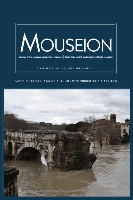
Mouseion-Journal of the Classical Association of Canada
Fostering interdisciplinary dialogue in Classics.Mouseion - Journal of the Classical Association of Canada, published by University of Toronto Press Inc, stands as a vital academic resource in the fields of Classics and Archaeology. With a focus on promoting scholarly discourse, this journal provides a platform for original research, critical reviews, and interdisciplinary studies that engage with ancient cultures and their legacies. Since its convergence in 2019, Mouseion has quickly established itself within the academic community, achieving a commendable Q1 ranking in Classics and Q2 in both Archaeology categories in 2023, showcasing its commitment to excellence. While not an open-access journal, it is positioned among the top 29% of classics journals, reflecting its impact and the quality of publications. Nestled within Canada, this journal addresses a global audience of researchers, professionals, and students dedicated to the exploration of the classical world, and it endeavors to contribute significantly to the scholarly understanding of cultural heritage.

Exemplaria Classica
Elevating Classical Scholarship for Future GenerationsExemplaria Classica, published by Universidad de Huelva's Servicio de Publicaciones, is a prominent academic journal dedicated to the fields of Classics and Literature and Literary Theory. Established in 2011, this journal serves as a vital resource for scholars, educators, and students interested in the rich tapestry of classical literature and its enduring influence on contemporary thought. With an ISSN of 1699-3225 and an E-ISSN of 2173-6839, it has firmly established itself in the academic community, although it currently holds a Q4 ranking in both its categories. The journal is ranked #712 out of 1106 in Literature and Literary Theory and #129 out of 170 in Classics as per Scopus rankings, reflecting its emerging status in these fields. Despite its open access designation being currently unclear, Exemplaria Classica is essential for advancing discussions and research in classical studies and has covered a diverse range of topics over its publishing years, making it an important addition to any academic library.

Boletim de Estudos Classicos
Advancing Research in Underrepresented ClassicsBoletim de Estudos Clássicos is a distinguished scholarly journal dedicated to the field of Classics and Education, published by COIMBRA UNIV PRESS. Since its transition to an open-access format in 2013, the journal has aimed to broaden the accessibility of high-quality research and critical discussions within these disciplines. Despite its current categorizations in the Q4 quartile for both Classics and Education, the Boletim has a unique opportunity to serve as a platform for emerging voices and innovative research, fostering growth in an otherwise underrepresented area. Based in Portugal, the journal invites contributions that encompass a wide range of topics, from ancient texts and historical analysis to educational methodologies and pedagogy. With an ISSN of 0872-2110 and an E-ISSN of 2183-7260, the journal actively seeks to attract researchers, professionals, and students dedicated to the exploration of classical studies. The journal's address is RUA DA ILHA, NO 1, COIMBRA 3000-214, PORTUGAL, where its contributors and editorial board strive to inspire a deeper understanding of classical heritage and its relevance to contemporary education.